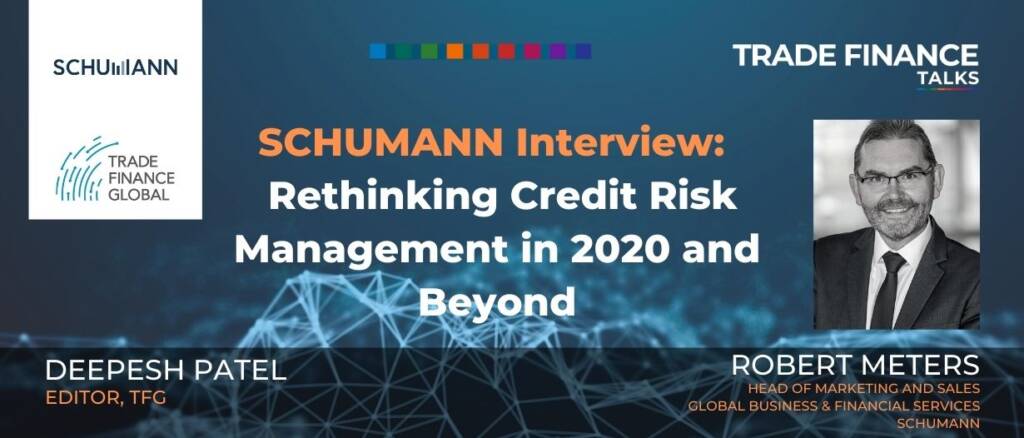Closing off City Week, TFG’s Deepesh Patel heard from the Chairman and Chief Executive of Commodity Futures Trading Commission, Heath P. Tarbert, on CFTC’s tremendous accomplishments in achieving integrity through sound derivatives regulation, resilience during Covid19, and fostering financial innovation through embracing technology.
Featuring: Heath P. Tarbert (HT), Chairman and Chief Executive, Commodity Futures Trading Commission
Host: Deepesh Patel (DP), Editor, Trade Finance Global
Backstory: Heath P. Tarbert as CFTC’s Chairman and Chief Executive
Deepesh Patel (DP): Thank you so much for doing this with us! What is your “backstory”? Tell us a little more about your role as Chairman and Chief Executive of the Commodity Futures Trading Commission
Heath P. Tarbert (HT): I am privileged to have joined the CFTC as Chairman and Chief Executive in July 2019. Our mission is to promote the integrity, resilience, and vibrancy of the US derivatives markets through sound regulation, and we work tirelessly every day to achieve that purpose. In conjunction with my work as Chairman, I also serve as a voting member of the Financial Stability Oversight Council (FSOC), a Vice-Chair of the International Organization of Securities Commissions (IOSCO) Board, and a member of the President’s Working Group on Financial Markets.
Previously, I was the Assistant Secretary for International Markets and acting Under Secretary for International Affairs at the US Department of the Treasury. In these roles, I served as the G-7/G-20 Deputy Finance Minister, a member of the Financial Stability Board (FSB), and the co-chair of both the US-EU Financial Regulatory Forum and the US-UK Financial Regulatory Working Group.
Prior to Treasury, I was head of the bank regulatory practice at a law firm your readers will be quite familiar with: Allen & Overy LLP. In fact, I began my legal career 20 years ago as a summer associate at the London office of Sullivan & Cromwell, which was tucked away in Ironmonger Lane. If you can believe it, my mentoring partner that summer was none other than Jay Clayton, now Chairman of the US Securities and Exchange Commission.
I returned to London several years later, where I served on the Faculty of Law at Oxford University on a US-UK Thouron Fellowship, which was created to deepen the bonds of friendship between our two countries. During my time in Britain as a student, I earned my doctorate in comparative law, and wrote my thesis on the City Code on Takeovers and Mergers.

CFTC as the global standard for sound derivatives regulation
DP: How does CFTC Commodity Futures Trading Commission promote the integrity, resilience, and vibrancy in the U.S. derivatives markets
HT: The CFTC’s mission statement is to promote the integrity, resilience, and vibrancy of the US derivatives markets through sound regulation. We have also adopted a vision statement for the first time our history: To be the global standard for sound derivatives regulation.
Sound regulation is key to both of these statements, which I view as doing the right things, with the right tools, at the right time, for the right reasons.
Over the next several years, we intend to achieve our mission through five strategic goals:
- Strengthen the resilience and integrity of our derivatives markets while fostering their vibrancy. We want to ensure that our markets are strong and have integrity, but they also enable innovation to thrive.
- Regulate our derivatives markets to promote the interests of all Americans. Derivatives markets are the underpinning of our free enterprise system, not only in the United States, but around the world; they have a significant impact on people’s day-to-day lives. We always seek to remember that in our work.
- Encourage market innovation and enhance the regulatory experience for market participants at home and abroad. It is critical that we establish the conditions for the derivatives markets to continue to thrive under a sound regulatory regime.
- Be tough on those who break the rules. In order to protect the integrity and ensure confidence in our markets, it is critical that we weed out bad actors through our strong and focused enforcement program.
- Focus on our unique mission and improve our operational effectiveness. This is primarily an internally-focused goal, but has important ramifications for how market participants interact with the CFTC.
World Bank’s Anshula Kant, on building sustainable, inclusive, and resilient socio-economic systems

DP: What is the role of derivatives and futures in the real economy?
HT: As noted above, futures, swaps, and options markets impact people’s daily lives in countless ways: from the price of gasoline we pay at the pump and the interest they pay on their mortgage to the price of the food on the kitchen table. Derivatives are the underpinning of the free enterprise system, not only in the US, but around the world.
This is what makes the CFTC unique: the derivatives markets touch on so many of the underlying markets. We indirectly regulate everything from gas to corn to crypto, to swaps markets. So we have to have a deep understanding of the agriculture, energy, and financial sector, and now the blockchain community, which is an exciting daily challenge.
CFTC’s Covid-19 Response
DP: What is CFTC doing to address the COVID-19 crisis and respond to its impact on the markets?
HT: We witnessed significant volatility in the derivatives markets in the wake of the COVID-19 pandemic, particularly during February and March. The CFTC has been focused on responding to the impact of the pandemic on the markets we regulate in order to ensure that they can continue to fulfill their critical risk management role in the global economy.
More specifically, we have taken the following actions:
- First, the agency has continued to monitor closely and prioritize energy and agricultural markets.
- Second, we issued targeted, temporary relief to market participants so trading activities could continue to function in quarantine.
- We have continued to bolster the CFTC’s customer education efforts. Times such as these unfortunately create new opportunities for fraud, and we have increased our efforts to arm the public with information so they can detect and avoid these illegal schemes.
- Finally, we continue to work closely with the FSB and international standard setting-bodies to attempt to diagnose the causes of the market stresses in March and seek to identify any potential future vulnerabilities stemming from the pandemic.
One of the most interesting aspects of the recent market volatility is how well the derivatives markets have performed. Far from amplifying risk throughout the financial system, the derivatives markets have acted as shock absorbers, and unlike during the 2008 financial crisis, they have internalized the impact of market swings.
DP: Has COVID-19 impacted your policy agenda, and have any of your positions changed recently?
HT: When we witnessed the market volatility caused by Covid-19, it became our priority to address the needs of our market participants and protect the public from fraud and other misconduct. We issued regulatory relief to just about every category of market participant. And we worked with industry groups, including the FIA and ISDA, and other similar organizations to not only provide regulatory relief but also to mitigate any risks to the market and to the public in providing that relief.
Commitment during LIBOR transition
DP: How is the LIBOR transition being handled at CTFC?
HT: The transition from LIBOR and other IBORs is an issue that the CFTC has been monitoring closely, in collaboration with our counterparts at home and abroad. The importance of a smooth transition to alternative reference rates cannot be understated, particularly for legacy swaps that are on the books of swap dealers, their clients, and end-users.
The CFTC, in December 2019, issued relief to swap dealers and other market participants regarding the IBOR transition. We recently updated that relief, in August of this year, reaffirming our commitment to easing this transition and particularly reflecting the fact that clearinghouses will be implementing their planned transition of discount rates. In a nutshell, the concern is that when existing swaps transition from referencing LIBOR or another IBOR to referencing another benchmark, it could be considered a new swap – which, in turn, would entail a number of requirements. We basically issued relief premised on the idea that swaps amended as to their reference rate would not constitute new swaps which would then be subject to a host of additional requirements and potential adverse consequences.
We remain committed to encouraging a voluntary transition to alternative rates, assuring continuity of swaps transactions, and building liquidity and depth into alternative reference rate markets. In fact, we understand that firms have proactively started managing their risk exposures in anticipation of the expected transition.
DP: What’s the importance of standards-setting bodies when it comes to supervisory cooperation and international coordination?
HT: Standard setting bodies (SSBs) are important institutions promoting international financial supervisory cooperation. Financial markets are global by nature. SSBs set international principles to help policymakers shape financial regulation, allowing for flexibility for regulators to adopt rules and regulations that would best meet the needs of their own markets. I have often said that while regulators have boundaries, financial instruments do not. SSBs are therefore crucial to international cooperation that provides a platform for the growth and development of financial instruments, and in turn, financial markets.

Next steps
DP: What is next on the agenda for you, in your role as Chairman and Chief Executive of the Commodity Futures Trading Commission, in the short to medium-term future?
HT: I am very proud of the CFTC’s work. Since I have been at the CFTC, we have held more open meetings to vote on rulemakings than in the prior six years combined; we have brought a historic number of enforcement matters this year; we have reached important meetings of the mind with overseas counterparts, including the European Union; we have responded to extraordinary volatility in financial markets prompted by the pandemic; and we have taken bold action to overcome unprecedented strains on our workforce and technology. I congratulate the entire CFTC staff for their tremendous accomplishments.
First, I have always held as a tenet of my chairmanship to be transparent in rulemaking, to provide opportunity for notice and comment, and to encourage public participation. In so many ways, the CFTC is the most important regulator many have never heard of, so I look forward to continuing to find new ways to engage our market participants as well as the public.
Secondly, fostering financial innovation has also been an important tenet of my chairmanship. The CFTC is unique in the regulatory world because we make significant use of principles-based regulation. Taking this approach allows technological developments and innovation to flourish to meet the demands of the growing financial markets.
And finally, I remain deeply committed to a strong enforcement program. It is of paramount importance for – the integrity of our derivative markets – to hold wrongdoers accountable and keep our markets safe from fraud and manipulation.





























